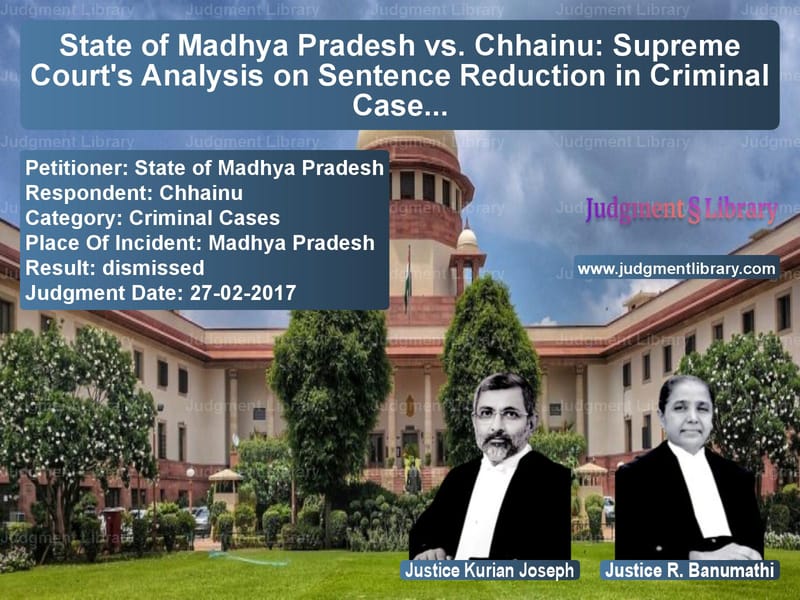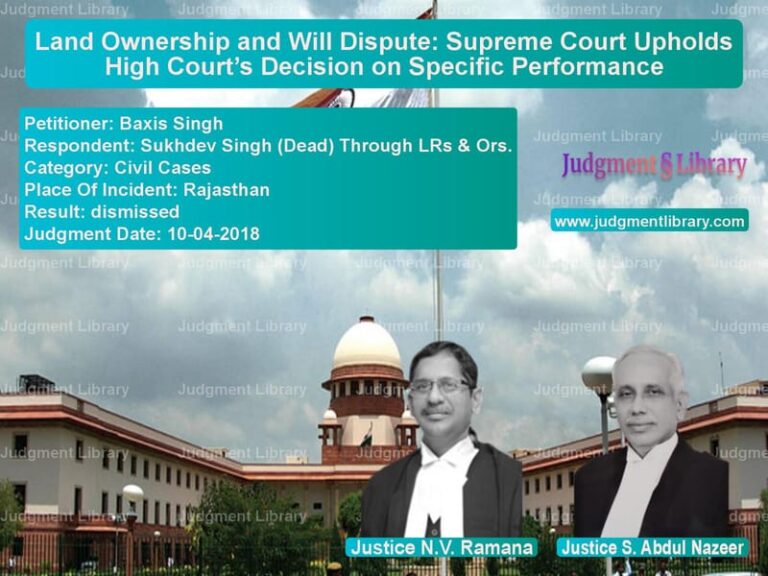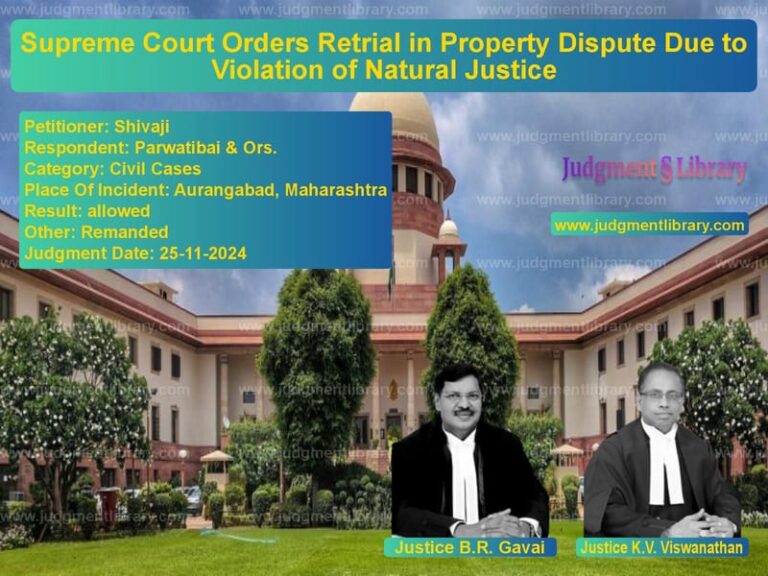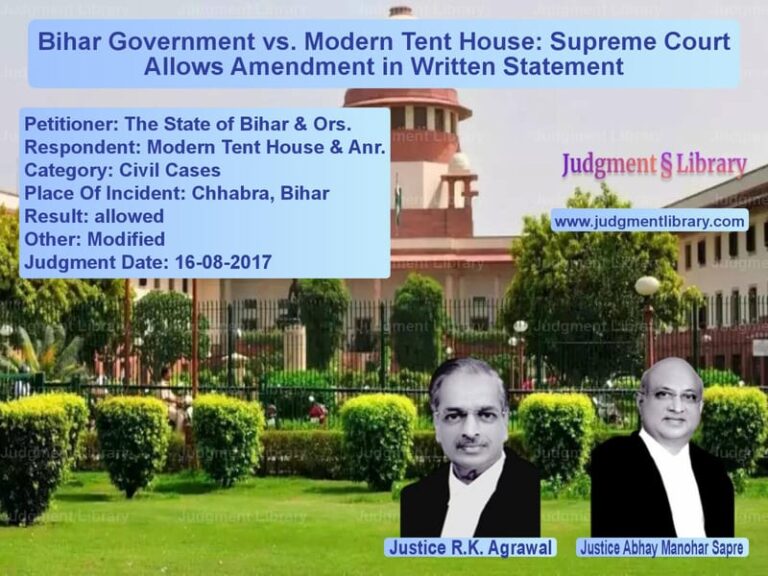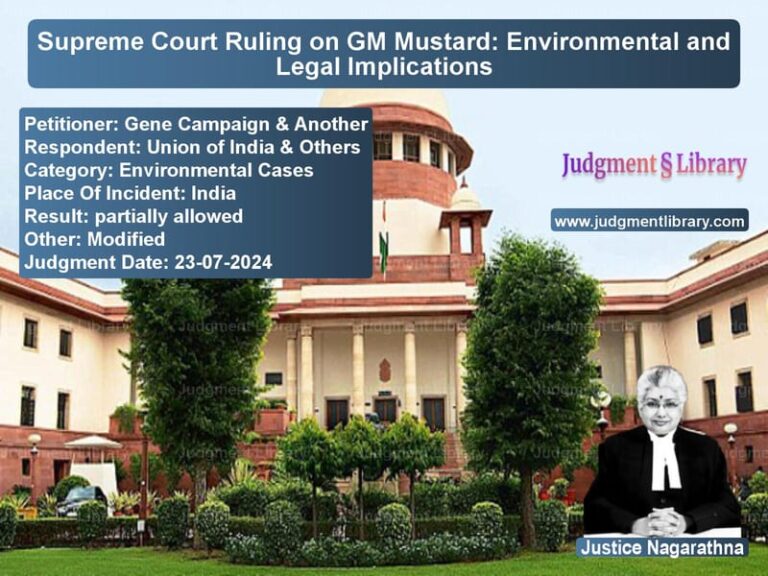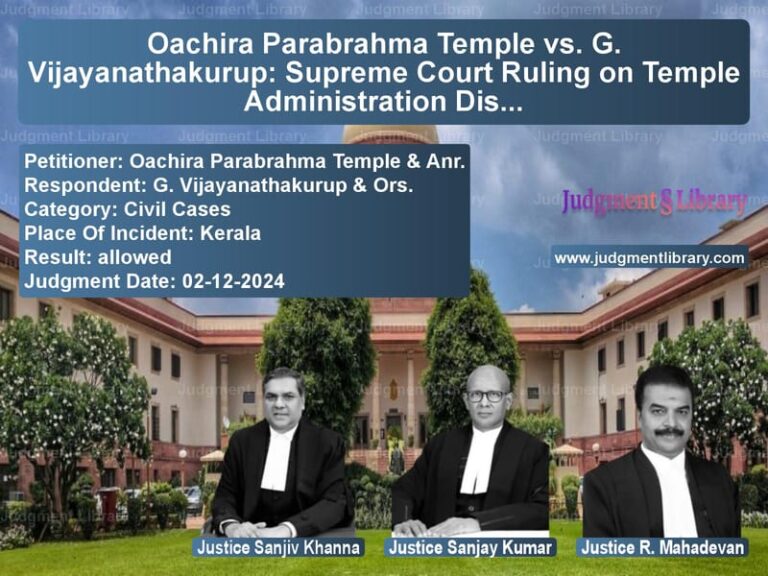State of Madhya Pradesh vs. Chhainu: Supreme Court’s Analysis on Sentence Reduction in Criminal Cases
The case of State of Madhya Pradesh vs. Chhainu is a significant judgment that examines the scope of sentence reduction in criminal matters, particularly under Section 326 IPC. The Supreme Court’s verdict in this case highlights how courts assess sentencing through the lens of mitigating circumstances, socio-economic factors, and the length of time that has elapsed since the incident.
The matter arose when the State of Madhya Pradesh challenged the decision of the High Court, which had significantly reduced the sentence of the accused, Chhainu, to the period already undergone—just 17 days—while enhancing the fine to Rs. 4,000. The Supreme Court, though expressing dissatisfaction with the approach of the High Court, chose not to interfere with its ruling. The case presents an interesting discussion on whether the severity of the offense should always be matched with proportional sentencing or if circumstances allow for leniency.
Background of the Case
The case traces back to 1984, when the accused, Chhainu, was involved in an incident leading to his conviction under Section 326 of the Indian Penal Code (IPC). This section pertains to voluntarily causing grievous hurt by dangerous weapons or means. Over the years, the case proceeded through various judicial levels, and eventually, the High Court of Madhya Pradesh modified the sentence to the period already served. Dissatisfied with this ruling, the State of Madhya Pradesh filed an appeal before the Supreme Court.
Arguments by the Petitioner: The State of Madhya Pradesh
The State of Madhya Pradesh, represented by the prosecution, presented a strong argument against the reduction of the sentence. Their key contentions were:
- The offense committed under Section 326 IPC is of serious nature and reducing the sentence to just 17 days sets a poor precedent.
- The High Court did not provide a strong legal justification for reducing the sentence and increasing only the fine.
- Criminal justice requires that punishment serves as a deterrent to prevent similar crimes.
- Sentencing should be proportionate to the severity of the crime, and reducing a serious offense’s punishment may weaken public trust in the system.
Arguments by the Respondent: Chhainu
The respondent, Chhainu, countered the appeal with the following submissions:
- He was a poor laborer with limited financial means and had already spent a significant amount of time dealing with court proceedings.
- He had two daughters, one of whom was married while the other was yet to be married, and any further imprisonment would create severe financial distress.
- He expressed his inability to pay an additional fine but stated that he was willing to work and earn to pay any imposed fine.
- The police confirmed that he had no other criminal records and had not been involved in any further illegal activities.
Key Observations by the Supreme Court
The Supreme Court, while evaluating the appeal, noted several important aspects:
“In the peculiar facts of this case, we are not inclined to interfere with the order passed by the High Court, though we are not quite happy with the manner in which the High Court has dealt with the case of the respondent in a case of conviction under Section 326 IPC.”
In addition, the Court considered the following factors:
- The accused had already served 17 days in jail and had not engaged in any further criminal activities.
- The long duration (over 30 years) since the incident meant that additional imprisonment would serve little practical purpose.
- The Court acknowledged that the High Court’s decision was lenient but took into account the respondent’s financial situation and absence of further criminal behavior.
Final Judgment
The Supreme Court dismissed the appeal, stating that while it was not fully satisfied with the High Court’s approach, it would not interfere with the decision. The Court thus upheld:
- The reduction of the sentence to the period already undergone.
- The enhancement of the fine to Rs. 4,000.
- The closure of all pending interlocutory applications.
Legal Implications
The judgment in this case raises several key legal considerations:
- Sentencing Discretion: The case highlights how courts balance the gravity of an offense with factors like time elapsed, the accused’s personal circumstances, and the impact of further imprisonment.
- Socio-Economic Factors: The Supreme Court’s ruling demonstrates that financial hardship and social responsibilities of an accused can influence sentencing outcomes.
- Judicial Review of High Court Decisions: While the Supreme Court did not approve of the High Court’s leniency, it recognized the larger picture and chose not to overturn the decision.
- Precedent for Future Cases: The judgment might serve as a reference for cases where long durations have passed between an offense and its judicial outcome.
Conclusion
This case illustrates the complexity of criminal sentencing in India. While the offense under Section 326 IPC was serious, the long gap between the crime and sentencing, coupled with the accused’s personal circumstances, led to an outcome that prioritized rehabilitation over prolonged punishment. The Supreme Court’s verdict affirms that the justice system is not just about punishment but also about ensuring that justice is served in a fair and balanced manner.
Don’t miss out on the full details! Download the complete judgment in PDF format below and gain valuable insights instantly!
Download Judgment: State of Madhya Prad vs Chhainu Supreme Court of India Judgment Dated 27-02-2017.pdf
Direct Downlaod Judgment: Direct downlaod this Judgment
See all petitions in Attempt to Murder Cases
See all petitions in Bail and Anticipatory Bail
See all petitions in Fraud and Forgery
See all petitions in Judgment by Kurian Joseph
See all petitions in Judgment by R. Banumathi
See all petitions in dismissed
See all petitions in supreme court of India judgments February 2017
See all petitions in 2017 judgments
See all posts in Criminal Cases Category
See all allowed petitions in Criminal Cases Category
See all Dismissed petitions in Criminal Cases Category
See all partially allowed petitions in Criminal Cases Category

